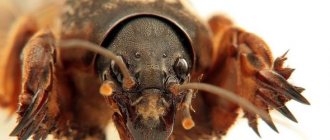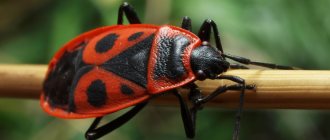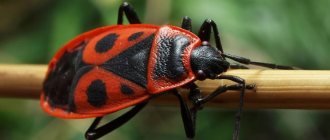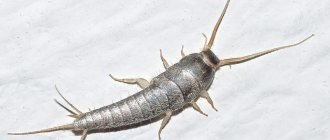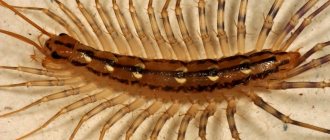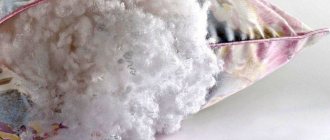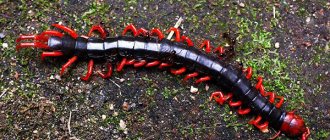Small blood-sucking parasites such as furniture bugs choose secluded places in human apartments to live. These insects are synanthropes, that is, they live next to humans and are to some extent dependent on them. Insects dominated the Earth long before humans appeared. Over millions of years, bedbugs have acquired truly limitless adaptive abilities. It is for this reason that it is very difficult to fight them - insects quickly develop resistance to poisons, and mechanical methods of extermination are ineffective due to the high reproduction rate.
Insects are parasites in our apartments
It is comfortable and cozy to live in apartments not only for humans, but also for insects - parasites. The most unpleasant ones are bedbugs.
Not only do they pollute the territory and spread diseases, but they also bite their owners. Furniture bugs get their name from their habit of living in closets, sofas and beds. But this is the same bed, linen, and household parasite.
Mechanical method
Bedbugs can be collected. They don't move very fast, especially when they drink blood. In addition, they are clearly visible on light-colored upholstery. Of course, this is an unpleasant, ineffective method, but it can be used. You can collect them manually, but it is better to use a vacuum cleaner. If the vacuum cleaner has good power, then it can get bedbugs from under the upholstery. You can also use fly tape to catch some of the bugs as they move. Bedbugs collected by hand or with a vacuum cleaner do not die, so it is necessary to use insecticides against them or send them to the sewer.
Where do bedbugs come from in furniture?
When inhabiting an apartment, bedbugs look for cozy and safe places. There they will hide, digest food, and lay eggs.
Nocturnal parasites do not tolerate daylight well. They try to settle closer to the source of food - humans, but quickly take refuge with the onset of morning.
Furniture is ideal for this - beds, sofas, cabinet furniture, wardrobes. It is there that there are many cracks, joints, corners, transitions, and connections that bedbugs love so much. There they take refuge during the day and lay eggs.
Few people worry about nocturnal parasites in furniture. If the bed linen is turned over and rearranged, then the insect is not often destroyed in the crevices of the closet. Traces of parasites are not always visible there, so they prefer to seek refuge in furniture.
The sources where bedbugs come from can be different:
- from neighboring apartments via common communications;
- from stores with furniture, things (larvae are often carried in cardboard packaging);
- with visitors - guests, workers, builders, tenants;
- with animals - parasite eggs can be on the fur of birds, cats and dogs.
Bedbug eggs remain viable for a long time. Finding themselves in favorable conditions, they develop into an adult and begin to develop the territory.
Why furniture?
Bedbugs, which parasitize only on human flesh, settle in those places from which they can most quickly reach their prey after dark. In addition, bloodsuckers have a negative attitude towards daylight, so they prefer to sit out in secluded places hidden from the human eye. You can’t imagine anything better than furniture with many abutments, folds, seams and joints. Bedbugs are chosen for colonization and reproduction:
- sofas;
- beds;
- orthopedic mattresses;
- cabinet furniture;
- window/door openings, etc.
Signs of infection
The habitats of bedbugs are called nests, although these nocturnal parasites do not make buildings. They gather in one place to keep warm.
From above, a bug nest looks like a solid moving mass. Every day a furniture bug can make a new nest.
The way to the parasites' habitat can be found by their excrement, which looks like poppy seeds. There may be whitish shells nearby - these are the chitinous covers of the larvae.
The nest contains the bugs themselves, the larvae, and the eggs are empty and at the maturing stage. When directed at this cluster of light, furniture bugs begin to scatter.
Parasites often inhabit old furniture, where there are more cracks and holes. They love to hide in corrugated cardboard, cabinet furniture, and under the windowsill.
The general rule is that bedbugs will settle within 3 meters from a food source, that is, from a person’s sleeping place, in order to have access to blood.
Answers to popular questions
Let's look at the list of the most popular questions that people ask when encountering parasites for the first time:
- we bought a sofa, and after some time we discovered bedbugs inside it. Do these insects live in new furniture? Yes, sure. Often these parasites are brought into the house with new furniture. They end up there during storage in the warehouse or from the belongings of other customers.
- Do you need to throw away your sofa after treatment? If it is old and has been asking for a replacement for a long time, it is wiser to throw it away before processing and carefully inspect the room. If the furniture is new, there is no need to throw anything away; modern insecticides can destroy the entire population, including bedbug eggs.
- Can bedbugs get in a leather sofa? Yes, but such furniture is not suitable for these insects.
We'll take a closer look at the answers to the following popular questions.
Are bedbugs dangerous?
The sofa bug is dangerous because it can serve as a carrier of infectious diseases.
In addition, multiple bites (their number, if the room is heavily infested with parasites, can reach several hundred) disrupt restful sleep and can cause an allergic reaction. Victims (most often these are children) by scratching the bite site can introduce an infection into the wound, where an inflammatory process subsequently develops and an abscess breaks out. Sometimes, with regular blood loss, babies develop iron deficiency anemia.
Not everyone knows that marks on the human body are left not only by adult individuals, but also by their larvae. Unlike blood-sucking creatures that have reached sexual maturity, they are not able to inject an analgesic when piercing the skin, so their bites are quite painful.
Where is the largest concentration of insects in the sofa?
In upholstered furniture, sofa bugs are most often located:
- under the bottom.
- In places where the upholstery or structure is damaged (chips, holes, cracks, etc.).
- At the joints, between the armrest and the berth.
- Along the seams and folds of upholstery fabric, including the back wall of furniture.
To detect insects, you need to move the sofa away from the wall, turn it over, remove removable elements, raise the mattress and pillows.
How bedbugs infest sofas
Bed bugs do not appear immediately on the sofa. It happens that the insect was brought by someone from the street. Having detached itself from its host, the adult lives for some time in the folds of the sofa, periodically emerging for a meal. If the living conditions are suitable, she will begin to lay offspring; if not, she will crawl further in search of a more suitable home.
Insects that get inside the house along with furniture and household appliances, as a rule, already live there in entire colonies and actively breed. Then the process of forming a new settlement is a matter of time.
Appearance of a furniture bug
A photo of a furniture bug gives an idea of its appearance. This is what a furniture bug looks like - it has a flat body so that it is convenient to get into narrow crevices.
It is covered with a chitinous shell, making it difficult to crush. The body consists of segments. It can increase when the insect drinks blood.
In a hungry state, a furniture bug measures only 3 mm. Having drunk blood, it swells to 8 mm. The color of the bug's shell is brown and begins to darken with age.
A well-fed insect has a darker color. The parasite does not have wings. With its proboscis on the head, it pierces the human skin, injects saliva for pain relief, and begins to suck out blood.
The nocturnal parasite has special glands on its back. They secrete a substance that produces the characteristic odor of bedbugs. In a room where bedbugs live, an almond aroma appears.
The larvae are oblong, pale yellow, covered with mucus. They need food daily, unlike adults. After each meal, the larva grows and sheds its shell.
Her bite is painful, and she has no pain-relieving saliva yet. It is difficult to distinguish the larva from an adult bug, only by size; the larva is also almost transparent.
The eggs look like an almost transparent white capsule with a peculiar cap at one end. Its larva squeezes out and gets out.
Why are bedbugs dangerous?
Furniture bugs feed exclusively on blood. They have a piercing-sucking apparatus, which allows them to make punctures on the skin, stick to a blood vessel and become saturated with blood.
A person does not feel the bite itself, because when the skin is pierced, they release a special anesthetic substance that completely anesthetizes this process, and it goes unnoticed. They bite several times, so a mark in the form of a chain of 3-4 punctures remains on the skin.
As practice shows, they bite women and small children much more often than men. This is due to the skin, which in women and children is softer and thinner. Therefore, if they have a choice, they will not prefer men. Most often they bite in the back, stomach, arms, legs, and neck.
After they are saturated with blood, the analgesic effect ends, and the affected area begins to itch severely. A person scratches the bites, which causes the wounds to become infected.
Quite often, children develop an allergic reaction, and angioedema may occur. Of course, constant bites, itching and the understanding that there are bedbugs in the bed affect the psycho-emotional state.
There may be insomnia, irritability, nervous breakdowns. Although these insects are carriers of various microbes and bacteria, they cannot infect humans.
Difference from other bedbugs
Bed, linen and furniture bugs are definitions of the same domestic parasite. It can settle in different places, so the name will be different.
Finding a linen or bed bug is easier. On light-colored sheets it is easier to notice a dark speck of a parasite. Getting rid of such bedbugs at home is also easier. Bed linen is removed, processed, boiled, and, in extreme cases, thrown away.
Furniture bugs hide more securely. It is not always possible to detect them quickly. If the bedside table is located next to the bed, then it will be a convenient place for parasites to settle. Pictures above the sleeping area and nearby sockets are traditional areas for parasites.
Sometimes at the end of summer, a tree bug can fly into apartments on the lower floors . These are the insects that can often be seen in raspberries, accidentally taken into the mouth along with the berry.
By autumn, they turn from green to brown, look for secluded places, and mistakenly fly into apartments. They are not dangerous to humans and cannot bite. They just need to be released outside.
Nest detection
Bed bugs do not make nests. Such pests prefer to settle in any place convenient for them. If you do not take measures to combat parasites, they will fill all the dark and cramped corners of your apartment. A bedbug nest is a place where insects of all ages accumulate, eggs and remains of chitinous scales accumulate. The favorite habitat of bloodsuckers is leather and bedding furniture.
Some victims of home parasites wonder: are there bedbugs in suspended ceilings? We say with confidence that the blood-sucking parasite will happily settle in the joints of the foam and at night will jump on you for another portion of food. While searching for insects, pay attention to any strange odors and check their source. Without finding a place where bedbugs accumulate, it is quite difficult to get rid of them on your own.
Traditional methods of destruction
Furniture bugs reproduce very quickly, so extermination should begin immediately after the parasites are discovered. If the number is small, you can use traditional methods.
Herbs
Night parasites do not like strong odors; traditional healers suggest taking advantage of this property. Tansy, wormwood, Pyrethrum powder, essential oils are good remedies for bedbugs.
Dry branches of tansy and wormwood are sewn into gauze bags, laid out near the bed, in closets, bedside tables, under the mattress, behind the backs of upholstered furniture. Crushed parts of plants are poured into the cracks between the wall and baseboards, where insects are located.
Aromatic oils are applied to pieces of furniture, near the bed, and on the human body. Insects will not visit such places. Only in case of severe hunger are they able to overcome their aversion to the pungent smell.
Steam
Furniture bugs cannot tolerate high temperatures, which is what the steam treatment method is based on. Nests of parasitic insects are treated with a steam generator. This ensures the death of adults, larvae and eggs.
Streams of hot air must pass several times through the places where bedbugs are supposed to live to ensure destruction.
Laundry soap
An effective folk method is to use laundry soap. Mix a bar of dark laundry soap into warm water and dilute it until a strong foam forms. You shouldn’t take a lot of water at once; it’s better to add more as you go.
The solution is applied using a wide brush or sponge to fabric or hard surfaces until a soap layer is formed. In furniture, in the same way, you need to cover all existing cracks, joints, nail holes, and cracks with soapy water.
Soapy water has good surface tension. It penetrates the spiracles of parasites and closes them. Insects suffocate, but are also poisoned by the alkali of the soap. Soap solution has a different effect on eggs. The alkali draws water through the capsule, this dries out the eggs and they die.
Parasites quickly get used to the poisonous substance. Since it is not possible to remove bedbugs with one method, you need to combine methods with each other.
How to recognize a pest?
Externally, furniture bugs resemble sea crabs. A flattened body that has variable colors and three pairs of limbs are characteristic features of a blood-sucking parasite. The body of a male is two times smaller than that of an adult female. The main organ of the pest is the mustache. With their help, bedbugs that live in furniture can easily pick up the smell and location of a person.
During reproduction, and sensing danger, the insect emits a special smell reminiscent of nutmeg. Thanks to the flat shapes, bedbugs easily settle in the joints of furniture. The parasite's egg is oval, less than a millimeter in size, and white in color. Its upper part resembles a lid, by lifting which the larvae are born. If you know what nocturnal bloodsuckers look like, it is not at all difficult to distinguish them from other indoor insects.
Chemical control
If the question arises - how to quickly get rid of furniture bugs, then you need to use chemicals.
Modern products are effective against insects and are safe for humans and pets. Popular drugs are presented in the table.
| Name | Description |
| Liquid preparations | |
| Executioner | A concentrated solution that must be diluted in water to the desired concentration. Destroys bedbugs and larvae. Dissipates quickly in air. |
| Fufanon | Concentrated solution, must be diluted for spraying. Paralyzes insects. The drug is poisonous and precautions must be taken when using it. |
| Aerosols | |
| Insecticide | Spray. Economical to use. One can is enough for three rooms. Toxic, safety precautions must be observed. Effectively fights against adults and larvae. |
| Carbosol | Spray. Affects the nervous system of bedbugs, leading to paralysis. It washes off well with a soda solution. Highly flammable, toxic, use safety precautions when using. |
| Powders | |
| Neopine | Odorless powder. It retains its properties for several hours after use. Does not kill insects, only stops reproduction. |
| Riapan | Has no smell. It is necessary to spray a thin layer without gaps. Well suited for upholstered furniture because it leaves no marks. You cannot remove the powder for 3 weeks while the drug remains active. |
| Microencapsulated | |
| Minap 22 | Suspension, diluted with water. The technology ensures the effect of the toxic substance for 12 months. Has no smell. |
| Xulate C25 | Concentrated solution. Does not affect eggs. The duration of activity of the drug is 6 months. Has no smell. Does not leave marks on fabric. |
For furniture, it is better to use preparations that do not leave marks after treatment. Powders will leave behind a clean area. Anything that involves liquid must first be tested on fabric, then only applied on upholstered furniture.
Powders are inconvenient to use when treating vertical surfaces. Spraying is preferable here. Aerosols will also reach hard-to-reach places better. You will need to choose drugs based on the conditions.
Modern drugs
Nowadays there is a wide range of chemicals on sale that allow you to fight bedbugs.
Further in the table you can get acquainted with popular insecticides, their cost, effectiveness, toxicity level and choose the most suitable option.
| A drug | Release form | Efficiency | Toxicity level | Smell | price, rub. |
| Tetrix | Concentrate (diluted with water) | High | High | Strong, sharp | 2000 (250ml) |
| Get | Concentrate (diluted with water) | High | High | Absent | 800 (100ml) |
| Cucaracha | Concentrate | High | Average | Strong, sharp | 1500 (1l) |
| Fufanon (Karbofos) | Powder, concentrate | High | High | Strong, sharp | 150 (1l) |
| Forsyth | Concentrate | Average | Average | Strong, fades quickly | 250 (50ml) |
| Carbosol | Aerosol | Average | Average | The smell of coffee | 100 (300ml) |
| Pyrethrum | Powder | Low | Short | Weak | 600 (300g) |
| Riapan | Powder | Average | Average | Weak | 200 (125g) |
| Delta zone | Concentrate | Average | Average | Weak | 700 (50ml) |
| Combat | Aerosol | Average | Average | Mint flavor | 300 (300ml) |
| Raid | Aerosol | Average | Average | Strong, sharp | 200 (300ml) |
You should always remember that the more effective the product, the more toxic it is, and therefore poses a danger to human and animal health. The use of drugs must be carried out strictly according to the instructions in compliance with all safety measures.
If it is not possible to carry out the processing yourself, you can contact specialized services that will quickly carry out all the work and with the most positive results.
Preventing re-infestation of furniture
After treatment, you want to never think about bedbugs again. But undestroyed parasite eggs may remain in the room, and there is a risk of a new infection in the apartment. To prevent this, you need to take a number of preventive measures:
- eliminate all possible ways for bedbugs to enter the premises, this will block the access of parasites from neighbors;
- seal the cracks in the room, this will deprive bedbugs of shelter;
- check all things that are brought into the apartment - bags, suitcases, clothes from stores, for the presence of bedbug nests;
- Do not leave cardboard packaging overnight, throw it away immediately. Often this is where insects live;
- regularly carry out wet cleaning with the addition of aromatic substances;
- iron bed linen from the wrong side with a hot iron on both sides using steam. This will help get rid of parasite eggs;
- a furniture bug rarely finds refuge in an orthopedic mattress. It's too soft for an insect. But if the nest has formed in the mattress, then it will have to be thrown away, because it is difficult to treat it thoroughly with drugs. Even if it's modern chemicals. The larvae or eggs remaining deep inside will give rise to a new colony of parasites.
Maintaining cleanliness will be a good prevention of infection. The eggs of many domestic parasites, along with dust and soil, are brought from the street on shoes, toys, wheels of strollers, bicycles, and animal paws. Treatment with bactericidal compounds will eliminate many diseases and problems with domestic parasites.
Preparation before removing insects
Before you begin the process of eliminating bloodsuckers in the sofa, you need to prepare the entire living space for this. Its competent processing will contribute to the effectiveness of the procedure.
Preparation includes the following steps:
- Carrying out wet cleaning of surfaces to remove dust, eliminating all deposits of things.
- Preventing curtains and curtains from insect eggs by washing.
- Wash bed linen at temperatures from 60 C° to 90 C°.
- Processing of all decorative items located on the walls (paintings, carpets, etc.).
- Moving the location of furniture so that it is not pushed close to the wall.
- Emptying cabinets of items followed by heat treatment.
- Packing dishes in polyethylene.
- Place all food products in the refrigerator, including salt and cereals.
- Providing protection for household appliances using polyethylene film.
- Removal of all people and pets from the premises.
- De-energization of electrical wiring due to processing of sockets.
- Separating skirting boards from walls.
- Hermetically sealing doors and windows.
- Complete removal of the sofa from all textiles that are on it. These are covers, pillows, blankets.
It is important to note the need to ensure free access to water supply. It is possible that during the treatment of the premises from parasites, toxic substances will get into the eyes or onto human skin.
Oral apparatus and method of feeding
The parasite has a piercing-sucking type of mouthparts. The lower mandibles form a pointed tube, the lateral mandibles gnaw through the skin and push the tube deeper. Nearby is a groove into which the ducts of the salivary glands exit. The bug injects enzymes into the wound that have an analgesic, anticoagulant and astringent effect. The parasite prefers to bite in places with thin skin - the sides, the inside of the forearms. But more often you can find traces of bedbug bites on those parts of the body that remain naked during sleep.
Interesting!
To be able to fertilize a female, and for a female to lay eggs, parasites need to be completely “refueled” with blood at least twice. A female can suck about 7 mg of blood at a time, which is three times her own weight. By the color of the abdomen you can determine how long ago the furniture bug fed. The color varies from scarlet (fresh blood) to almost black (digested blood, feeding time is about 3-4 hours).
A bed or furniture bug feeds on blood at all stages of development. To transition to the next instar, larvae need to feed more often than adults. On the abdomen, legs and antennae of the insect there are sensitive sensors that respond to temperature and smell. Thanks to them, the bug senses its prey at a considerable distance.
Bedbug bites
An insect bite does not pose a threat to humans. Dangerous are proteins in saliva that cause an immune response and viruses that can persist inside the parasite for a long time in a virulent state. Bites are characteristic of parasites. Furniture bugs leave trails of several traces after their “meal”. Linearity is due to the fact that the insect moves along the blood vessel. It is this location that signals the presence of furniture bugs in the house. Adult bloodsuckers and their nymphs can bite.
Reproduction method and life cycle
It is interesting to study how the furniture bug reproduces. Mating occurs through traumatic means. The furniture bug pierces the female's abdomen with its sharp genital organ and injects seminal fluid. It is transported to a special organ, where it can remain for a long time and be used as needed.
Interesting!
The gametes that are in the female’s body are used by her as a source of nutrition in emergency cases. This increases the chances of survival, especially in the absence of food. Over the course of its entire life, a female lays 250-500 eggs.
With a favorable microclimate, a female can lay more than 5 eggs daily. In addition to storing gametes, the Berlese organ produces substances that promote regeneration during traumatic fertilization.
Bedbug eggs
When searching for a partner, the male is guided not only by the smell, but also by the size of the object. This is due to the fact that the larvae are very similar in appearance to the imago, but differ in size. The larger the object, the more ready it is for fertilization. Therefore, very often males “make a mistake” and copulate with males. What is also unique is that the seminal fluid in the body of the “covered” male is mixed with his own. Upon fertilization, it injects several sets of gametes into the female. Despite the fact that almost 50% of sexual intercourse is homosexual, valuable seed material is not lost.
The first stage nymphs emerge from the laid eggs within a week. There are five stages in total that the nymph goes through from emerging from the egg to the adult. The whole process takes 1-1.5 months. But everything in the life of a parasite depends on its living conditions.

